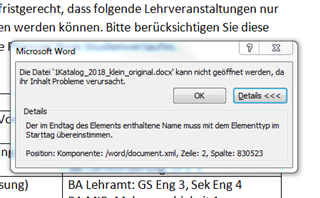Dear Trados Natives,
I would be so grateful if there was someone who could help me once again...
When I saved my final translation from Trados into the target word format it seemed to work. However, when I try to open this file I receive this message (in German...):
I'm not sure, what I have done wrong?! And then the difficulty becomes greater because when I try to look at the preview of the document with the "Print & View" option, the document is in a terrible format and half is missing!?! So I'm not sure what I'm doing wrong here either!
Thanks so very much for any help or tips on this!
Best regards,
Gabriella
Generated Image Alt-Text
[edited by: Trados AI at 2:00 PM (GMT 0) on 28 Feb 2024]


 Translate
Translate



